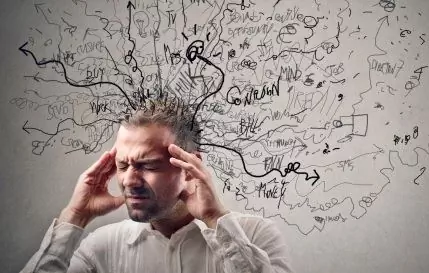- Author Rachel Wainwright wainwright@abchealthonline.com.
- Public 2023-12-15 07:39.
- Last modified 2025-11-02 20:14.
Nervous stress

The life of a modern person is simply impossible to imagine without stressful situations. However, it is they who are a kind of incentive to be active. The fact is that when any difficulties arise, the body begins to produce the hormone adrenaline. In turn, this helps to quickly find a way out of a difficult situation. However, nervous stress should be episodic. Excessively prolonged stressful conditions are dangerous for mental and physical health.
Nervous stress symptoms and consequences
The response of the human body to stress, negative emotions, or even just a daily routine is called nervous stress. And if in small quantities it is even useful, since it makes you think, take initiative, then when stress becomes constant, the body weakens, loses strength and the ability to solve problems. At the same time, immunity also decreases, cardiovascular, gastrointestinal diseases develop.
A person's stressful state can be roughly divided into three phases:
- Anxiety phase, when the body prepares to face a difficult situation;
- A period of resistance, when internal resources are used to cope with stress;
- The depletion phase, in which there is a depletion of the body's reserves.
With prolonged nervous stress, a person often has breakdowns, serious physiological disorders are observed. He becomes defenseless against various ailments. Under the influence of constant stress, even a person's perception of the world, his mood, changes. Moreover, not only he himself suffers from this, but also his relatives, who are forced to endure all the discontent, dissatisfaction and fatigue of the victim. It happens that as a result of accumulated stress, if a person does not know how to relieve nervous stress, a family breaks up, a career is destroyed, or a quarrel with a friend.
Fear or anxiety about moving to a new place of residence, changing jobs, grief from the death of a loved one, divorce, constant money problems, fulfilling obligations by a certain date, family problems, chronic lack of sleep can become the causes of nervous stress. Everything that annoys a person, clings to him, can provoke discomfort. Moreover, men and women are equally susceptible to this condition.
Constant anxiety, tension are a small part of the symptoms of nervous stress. After all, this is a kind of disease that is characterized by various signs. They can grow or appear suddenly, within a few minutes. For example, it can be panic attacks accompanied by feelings of dread, rapid heart rate, sweating, or uncontrollable anxiety and anxiety. Other symptoms of nervous stress:
- A constant feeling of irritability, depression, sometimes for no particular reason;
- Bad, restless sleep;
- Depression, tiredness, headache, unwillingness to do anything;
- Decreased concentration, thought speed, and memory problems;
- Lack of interest in others, even the closest people;
- Decreased appetite or, conversely, excessive absorption of food;
- Self-pity, tearfulness, melancholy, a constant desire to cry;
- Fussiness, distrust of everything, obsessive states such as nervous tics, or habits (biting nails, biting lips).
If a person is in a state of nervous stress, everything possible should be done to reduce its negative consequences.
Restoring the nervous system after stress
The impact of strong negative stimuli can cause prolonged stress in the body, its exhaustion, and exacerbation of chronic diseases. How to relieve nervous stress in order to prevent more serious diseases? A few simple ways to relieve stress will help with this:
- Conversation with a loved one. In difficult times, care and support are needed more than ever. Straight talk, friendly hugs, and an attempt to solve everything together make the situation easier, increase resistance to stress;
- Physical activity. Sports activities help to relieve stress, relax, heal the body. A good load improves sleep, and also makes the figure slim and fit;
- Work or hobby. A healthy hobby or job performance can distract from the problem;
- Walk in the garden or park. The color of the green helps the nervous system recover from stress. Therefore, after a hard day's work, many people just want to walk or sit on a bench in the park;
- Housework. Walking with children, cleaning the house, ironing clothes or washing windows will help you forget about the difficult situation for a while;
- Silent music, relaxation, a bath with soothing oils, massage, delicious food. All this helps to relieve tension, leads to a balanced state, inner peace;
- Proper nutrition. A complete diet and healthy food are important in treating nervous stress. Foods rich in vitamin C and group B are especially recommended. Food should be light and well absorbed;
- Good dream. There is no better cure for all diseases than a sound and healthy sleep. At the same time, the bedroom should not be stuffy or noisy, as this interferes with rest;
- Calm, even breathing helps to cope with nervous stress. You should take a deep breath through the nose, and exhale also, slowly, through the mouth.
Folk remedies give good results in restoring the nervous system after stress. So, a decoction of chamomile helps to cope with headaches, insomnia, and has a calming effect. Oregano and clary sage herbs are good for relaxation. Lemon balm is considered an excellent remedy for fatigue, which helps even with severe stress. It is also used for stress, anxiety, depression.

If you cannot cope with the problem yourself, you need to seek help from a psychologist or neurologist. Treatment of nervous stress is carried out on the basis of the specific reasons that provoked it. In some cases, drug therapy is prescribed with the use of antipsychotics, as well as tranquilizers. Spa treatment, xenon therapy, which has the ability to eliminate foci of stagnant excitement in the nervous system, resulting from the action of difficult circumstances, has a good effect for relieving stress.
You should deal with nervous stress correctly, without driving yourself into a corner, relaxing in time and correctly assessing the scale of the problem.
Found a mistake in the text? Select it and press Ctrl + Enter.






